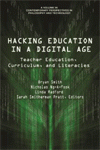
Hacking Education in a Digital Age
Teacher Education, Curriculum, and Literacies
Edited by:
Bryan Smith, James Cook University
Nicholas Ng-A-Fook, University of Ottawa
Linda Radford, University of Ottawa
Sarah Smitherman Pratt, University of North Texas
A volume in the series: Contemporary Perspectives in Philosophy and Technology. Editor(s): Nicholas Ng-A-Fook, University of Ottawa. Bryan Smith, James Cook University. Cristyne Hébert, University of Regina.
Published 2018
In this collection, the authors put forth different philosophical conceptions of “hacking education” in response to the educational, societal, and technological demands of the 21st century. Teacher Educators are encouraged to draw on the collection to rethink how “hacking education” can be understood simultaneously as a “praxis” informed by desires for malice, as well as a creative site for us to reconsider the possibilities and limitations of teaching and learning in a digital era.
How do we hack beyond the limits of circumscribed experiences, regulated subjective encounters with knowledge and the limits imposed by an ever constrained 21st century schooling system in the hopes of imagining better and more meaningful futures?
How do we foster ingenuity and learning as the end itself (and not learning as economic imperative) in a world where technology, in part, positions individuals as zombie-like and as an economic end in itself?
Can we “hack” education in such a way that helps to mitigate the black hat hacking that increasingly lays ruin to individual lives, government agencies, and places of work?
How can we, as educators, facilitate the curricular and pedagogical processes of reclaiming the term hacking so as to remember and remind ourselves that hacking’s humble roots are ultimately pedagogical in its very essence?
As a collection of theoretical and pedagogical pieces, the chapters in the collection are of value to both scholars and practitioners who share the same passion and commitment to changing, challenging and reimagining the script that all too often constrains and prescribes particular visions of education. Those who seek to question the nature of teaching and learning and who seek to develop a richer theoretical vocabulary will benefit from the insightful and rich collection of essays presented in this collection. In this regard, the collection offers something for all who might wish to rethink the fundamental dynamics of education or, as Morpheus asks of Neo in The Matrix, bend the rules of conventional ways of knowing and being.
CONTENTS
Acknowledgments. Introduction—Hacking Education in the 21st Century, Bryan Smith, Nicholas Ng-A-Fook, Linda Radford, and Sarah Smitherman Pratt. An Existential Hack of Neoliberal Discourses in Education, Sean Wiebe. Hacking Minds: Curriculum Mentis, Noosphere, Internet, Matrix, Web, Yu-Ling Lee and Stephen Petrina. “If the Stars Are Spotlights, I Wanted the Sun”: Hacking Children’s Literature in Raziel Reid’s When Everything Feels Like the Movies, Linda Radford. Curricula of Identity-Subjectivity in Distributed Social Media Spaces, Paul Eaton. Hacking “The Matrix”: Teacher Ontology at the Abyss of the Žižekian Real, Brian Gilbert. Cyborg Politics: Body-Data Assemblages and the Limits of Institutional Resistance, Nichole Grant and Pamela Rogers. New Literacy Threshold Concepts as a “Life Hack”, Patricia Altass and Sean Wiebe. Hacking Structures: Educational Technology Programs, Evaluation, and Transformation, Michelle Hagerman, Leigh Wolf, and Heather Woods. Digital Learning as Aesthetic Experience: A Call for a Meaning-Full Curriculum, Mei Wu Hoyt and Milan Jilka. Hacking My Way Through Digital Discomforts as a Literacy Teacher Educator, Elisabeth Johnson. About the Authors.
-
Paperback978-1-64113-200-8
Web price: $45.04 (Reg. 52.99)
-
Hardcover978-1-64113-201-5
Web price: $80.74 (Reg. 94.99)
- eBook978-1-64113-202-2

- EDU053000 - EDUCATION: Training & Certification
- EDU037000 - EDUCATION: Research
- EDU000000 - EDUCATION: General
-
 (Re)Envisioning Social Studies Education Research
Current Epistemological and Methodological Expansions, Deconstructions, and Creations
(Re)Envisioning Social Studies Education Research
Current Epistemological and Methodological Expansions, Deconstructions, and Creations
-
 A Practical Guide to Exemplary Professional Development Schools
A Practical Guide to Exemplary Professional Development Schools
-
 Beyond Single Stories
Changing Narratives for a Changing World
Beyond Single Stories
Changing Narratives for a Changing World
-
 Contemporary Perspectives on English as a Medium of Instruction
Contemporary Perspectives on English as a Medium of Instruction
-
 Teaching Human Development for Educators
Teaching Human Development for Educators
-
 The AMTE Handbook of Mathematics Teacher Education
Reflection on Past, Present and Future – Paving the Way for the Future of Mathematics Teacher Education, Volume 5
The AMTE Handbook of Mathematics Teacher Education
Reflection on Past, Present and Future – Paving the Way for the Future of Mathematics Teacher Education, Volume 5
-
 The Handbook for Aspiring Higher Education Leaders
The Handbook for Aspiring Higher Education Leaders

